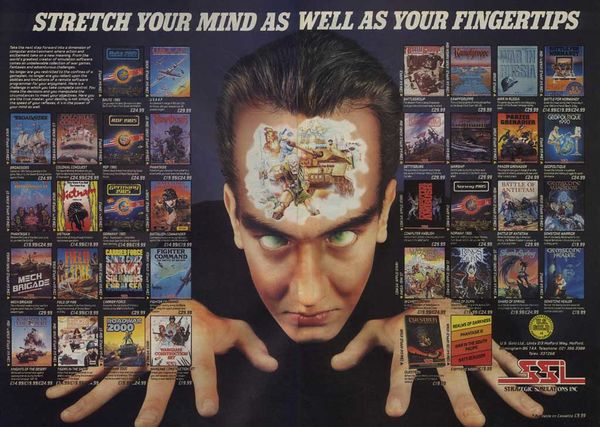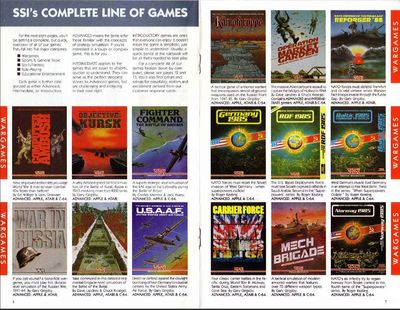Strategic Simulations
| Strategic Simulations, Inc. | ||
|---|---|---|
 | ||
| Founded | 1979 | |
| Closed | ca. 2001 | |
| Headquarters | USA | |
| Manager | ||
| Employees | ||
| Key People (choice) | Joel Billings, John Lyon, Ed Williger, Keith Brors | |
| Turnover | ||
| Sector | Video- and computer games | |
| Website | ||
| Information | ||
Strategic Simulations, Inc. was a game manufacturer and publisher of approx. 100 game titles. SSI was especially famous for its strategy games. Form SSI, there are also many well-known RPGs.
Origin[edit | edit source]
The company was founded in 1979. Joel Billings founded the company, because he had played strategy games since his childhood. As this was a mere niche market, there were hardly players. Therefore, Billings founded student clubs, to find opponents. When he got contact with computers, this seemed to him to be the adequate platform to develop strategic games on. However, there was only one strategic game that ran on a computer at that time and this was a mainframe. Therefore, he left inquiries in craft stores, which asked if anyone was interested in programming strategy games. The programmers John Lyon and Ed Willinger got in touch with him. They started with the titles Computer Bismarck and Computer Ambush. With risk capital provided by the Apple marketing manager at that time and the later Electronic Arts president Trip Hawkins, Billings founded the company Strategic Simulations, Inc. At the beginning, they developed for the Apple II and the TRS-80.
As Billings had played almost all Avalon Hill board games, he hoped, that they would agree to sell his games. However, Avalon Hill was not at all interested in computer games at first. After this backlash he made contact with Automated Simulations, who also showed no interest. So SSI had to take the sale into their own hands. In January 1980 Computer Bismarck was published and a bit later Computer Ambush. SSI did not pack its games into the typical plastic bags, but into big cardboard boxes. They even were considerably bigger than necessary and had about the size of the Avalon Hill board game boxes.
Although this package was rather untypical for computer games, they were soon placed in the shelves of computer stores. The business plan had originally envisaged that SSI would sell 90% of their games by mailorder. After they had sent a circular to the Apple Warranty list, which had at that time 20.000 subscribers, they suddenly received inquiries by merchants who wanted to sell these games in their stores. Already in March of the same year SSI sold 90% of their games over merchants and only 10% over mailorder. The package itself and the good quality of the package helped SSI to get the games into the shelves. Until 1984 SSI stuck to the big boxes, then they gave way to the usual sizes. Therefore, some games were first sold in big boxes and with the re-release in the usual box.
The first version of "Computer Ambush", on the Apple II, was unbelievably slow, the computer partially needed up to 3 hours for a single move. Even with rising success were the games still programmed in BASIC, but compiled, due to the speed. Furthermore, with this they had the possibility to adapt the games to the corresponding hardware.
SSI developed Graph-Pak and Square-Pak, to speed up the creation of maps and parameters. Almost all the games had the same engine. Billings named some of the games "Clone Games". The programmers only changed the parameters and maps of the engine and then had a new game. At that time, a developer could earn between 10.000 and 20.000 Dollars with one game.
The high period[edit | edit source]
In 1983 SSI started to market some games under the label RapidFire. Now SSI hardly developed games, but let them get developed by freelance developers. In 1984 SSI published 12 games, of which 6 came from newcomers. The magazine "Space Gamer" announced in their January Issue 1983 that the RapidFire series "should get all the prices for which it had been suggested". However, the series only lastet a few years. In the 80s SSI dominated the strategy games market. Avalon Hill, who first had no interest in computer games, was not able to compete with SSI, now that they finally surged onto the market.
In 1987 SSI bought the AD&D license and published 30 AD&D titles over the next years. Most of them were based on the Gold Box engine, which was named after the golden package in which these titles were usually sold. With this war games and simulations faded into the background, as the AD&D licenses soon became the principal source of income, but war games and simulations were not fully abandonned. Pool of Radiance skillfully combines the rules of AD&D with tactical elements and became a surprisins success overnight.
The downfall[edit | edit source]
When the AD&D license was lost to Interplay in 1994, the most important source of income broke away and pushed the end of SSI as an independent company. The fact that war games and simulations had been pushed too far to the background over the years now took its toll. With the companies Starbyte and Blue Byte distribution aggreements were negotiated. The famous game The Settlers by Blue Byte was sold in the USA unter the title Serf City. In the same years, SSI was finally taken over by Mindscape. SSI was then sold to The Learning Company and some time later taken over by Mattel Interactive. From there the company came to The Gores Group. They change the name of SSI to "GAME Studios" in January 2001. In March of the same year, "GAME Studios" was sold to Ubi Soft.
Starting from the takeover by Mindscape, SSI was forced to concentrate again on simulations and war games. The RPG line was abandonned. SSI was very successful with the 5 Star series and its most well-known title Panzer General. However, SSI was not especially concerned with the further development of the engine. Within 3 years the engine became more and more obosolete until SSI started to develop it further. This could be seen at the declining success of the games. In 1999, a new 3D engine was released, but it could not stop the downfall any more, they had taken too little care of the development. Further successful games of that time were Steel Panthers, Silent Hunter, SU-27 Flanker, Panzer Commander and the license title Warhammer 40k Chaos Gate. Ubi Soft let some series run some time futher, before the SSI logo and the games series finally disappeared from the shelves.
Miscellaneous[edit | edit source]
- SSI fans call the company GOM (Grand Old Man).
The SSI games library (excerpt)[edit | edit source]
- Battle for Normandy
- Battle of Antietam
- Buck Rogers - Countdown to Doomsday
- Fighter Command
- Geopolitique 1990
- Germany 1985 - When Superpowers Collide
- Gettysburg - The Turning Point
- Heroes of the Lance
- Nam
- Pool of Radiance
- Realms of Darkness
- Steel Barrier
- War in the South Pacific
- Wargame Construction Set
- Kampfgruppe
- Curse of the Azure Bonds
- Hillsfar
Advertisement[edit | edit source]
 |
 |
Links[edit | edit source]
| Wikipedia: Strategic_Simulations |